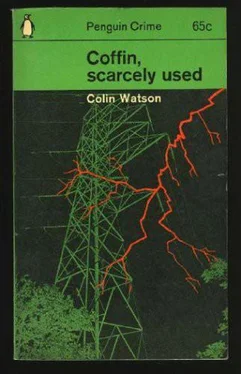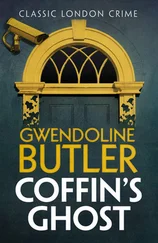“Aye, that’s so. God rest his soul.” This piety was delivered with a gentle shake of the head.
Mrs Carobleat eyed him coldly. “It’s God rest Marcus Gwill’s soul as well, now, doctor.”
“As to that, lady, the sentiment does you credit. It does indeed.”
“I gather you were a friend of Mr Gwill,” Purbright put in. “Is that so, doctor?”
“He was a patient of mine, inspector, and a very careful man.”
“He’d need to be.”
At this remark from Mrs Carobleat, Hillyard grinned and nudged Purbright. “Ye hear tha’ frae the wee body!” he chortled with grotesque bonhomie.
“For heaven’s sake, drop that phoney Scottishry, Rupert,” Mrs Carobleat’s voice had hardened, in spite of the familiarity.
Purbright looked at her for a moment, then rose from the table.
“I must be getting along,” he said. “I’ll come and see you at home some time, Mrs Carobleat, if I may.” He smiled at Hillyard. “Goodbye for now, doctor.”
Hillyard, who had suddenly relapsed into mournful thoughtfulness, suspired a soft ‘Aye’. Then he scowled and repeated the ‘Aye’ with dark, whiskilated ferocity.
Chapter Five
Seated in his own office again, Purbright was assailed by a sense not of the difficulty of his present task but of its remoteness from the orbit of his normal employment. The two were monstrously at odds. The routine whereby a small town was kept, as far as ordinary citizens could tell, a safe and well-ordered place had not been designed to cope with the ultimate in human desperation, any more than the Municipal Buildings had been designed to survive earthquakes. Purbright supposed that a murder could be solved by the same procedure as was used to detect a bicycle thief or the perpetrator of a charabanc outing swindle, and he was probably right. But what was missing was the comfort of precedent, the reassuring pattern of likelihood.
This crime was out of context. For one thing, its cleverness was uncharacteristic of Flaxborough, a town of earthy misdemeanours. He did not even know how Gwill had been killed. His seeing through the arrangement of apparent accident or suicide had pleased him at first. But he now realized he had merely chopped down a tree to disclose a forest.
The post mortem report, now lying before him, confirmed Dr Heineman’s earlier judgment. It added little of any significance. Yet there was one odd point. Purbright glanced down the closely typed lines until he reached it again:
“Burns. The palms of both hands bore marks of recent superficial burning, suggestive of manual contact with a source of electric current. The left palm exhibited a transverse burn, three-quarters of an inch wide and three inches long. Ball of thumb on this side also slightly burned. On palm of right hand was a burn mark, star or flower shaped, clearly defined, approximately two and a half inches in diameter.”
Star or flower shaped...Purbright knew little about electricity, but he was sure pylons bore no decorations of this kind. Where else were lethally charged stars or flowers to be found? He underlined the passage in the report and put it aside.
However Gwill had been killed, it could not have been done far from his own house. The slippers, the dumping of the body in the nearby field, the evidence of his having been seen late that night in the drive...
With a bucket of water, though: what explanation could there be for that piece of eccentricity?
Perhaps he had been as scared of ghosts as country neighbours—and Mrs Poole—supposed. She had said nothing specific, but there was no doubting the sort of fears she entertained. Yet that line of delusion was common enough. The police station complaint’s book was crammed with the fancies of supersensitive menopause subjects, ears alert for sounds from the spirit world.
Another thing. Heineman had found no injury or mark on the body apart from the burns. Gwill had needed no forcible inducement to grasp his death. He must have suspected nothing. Had his murderer been a friend? A relation?
Gain...Lintz seemed the only candidate there, at least until all the ramifications of his uncle’s financial position could be revealed. That might take time. Gloss, as his solicitor, should be the best source of information.
But how helpful would he be? By the Chief’s account, Gloss was touchy, odd, full of dark hints. Beneath his armour of professional canniness, he felt the sharp itch of fright. Police protection, indeed. Purbright could not remember such a request having been made in all his years with the Flaxborough force—not even when Alderman Hockley’s perpetration of the first-night drugging of the Amateur Operatic Society cast of Rose Marie (four of the Mounties had actually marched comatosely into the orchestra pit) was unmasked.
Gloss had been Gwill’s solicitor. But solicitors were not nowadays entertained to dinner by clients save in token of some more intimate relationship—or hold. Gwill seemed to have had an almost Edwardian penchant for entertaining professional men. The client of one guest. The patient of another. The potential subject (was that the word?) of a third.
The undertaker, Bradlaw.
A curious coterie, on the face of it. And, yet there need have been nothing sinister in the association. Perhaps Gwill and his three friends (who had been four in Carobleat’s day, the inspector reminded himself) had owed their affinity to nothing but a consciousness of being well-off by local standards.
Where did Mrs Carobleat come into things? The housekeeper obviously disliked her. But servants were notoriously sensitive to suggestions of immorality in their employers.
In turn, Mrs Carobleat seemed to have no love for Hillyard. Social jealousy? Or did she resent being the widow of a man whom Hillyard had failed to doctor successfully? Personal grievances against the medical faculty were not rare in Flaxborough. One’s doctor was something one boasted about to friends, like a cake recipe or a central heating system. It was hard to have to admit a let-down.
Could Hillyard, Purbright wondered, have had a hand in the snuffing of Gwill? It was conceivable that Gwill had received, amongst the gossip that accompanies the stream of news into a paper, knowledge of some hideous professional blunder by Hillyard; that he had threatened the doctor...
The thread of Purbright’s speculation was broken at this point by the entry of Sergeant Love.
Love unbuckled his raincoat and lit a cigarette. He flicked through a few pages of his notebook, put it back in his pocket and recited: “I, Gladys Lintz, am a married woman and forty-one years of age. I reside with my husband, George, in a nice house and already have a cocktail cabinet, a free pass to the Odeon, two beautiful children and the Telly. What, kill dear old Uncle Marcus? Why ever should I?”
“Quite,” said Purbright. “Now tell me what she said without really meaning to.”
“One, that husband George’s cold feet woke her up round about two o’clock this morning. Two, that she had a vague idea that Uncle’s affairs weren’t all on the up and up. Three, that she thinks the undertaker did it. Four, that she takes that back on second thoughts because Bradlaw’s elder sister has had a lot of trouble lately and she doesn’t want to add to it.”
“You do invite confidences, don’t you, Sid?”
“I’m every mother’s bloody son,” replied Love, without rancour.
“But can we sort out anything useful?”
“Well, she made no secret of Lintz having been out until the early hours. She thought he’d probably been to the Cons Club.”
“We can ask him about that. In fact we’ll have to, now. Poor George is the best prospect we have at the moment. But what was that she said about Gwill?”
Читать дальше












